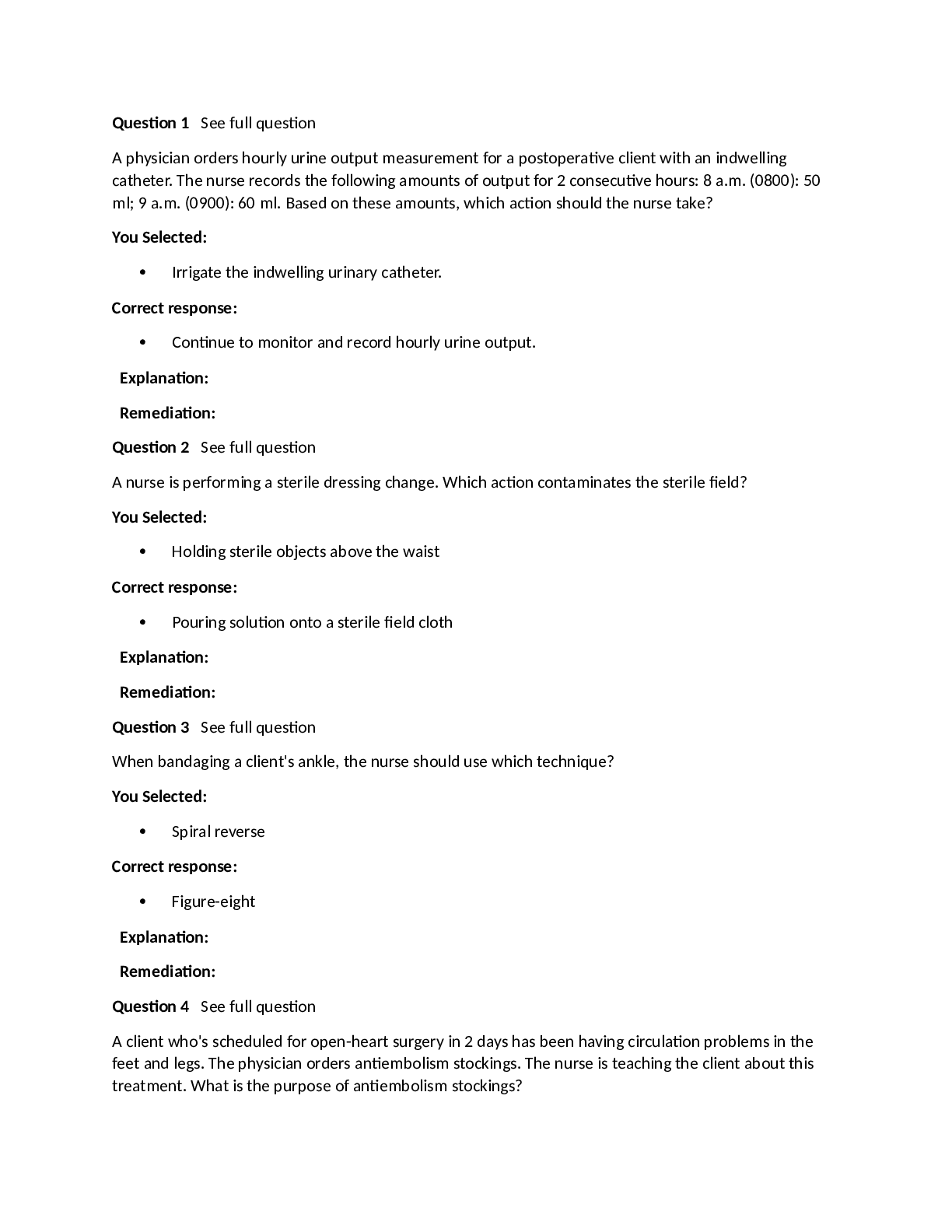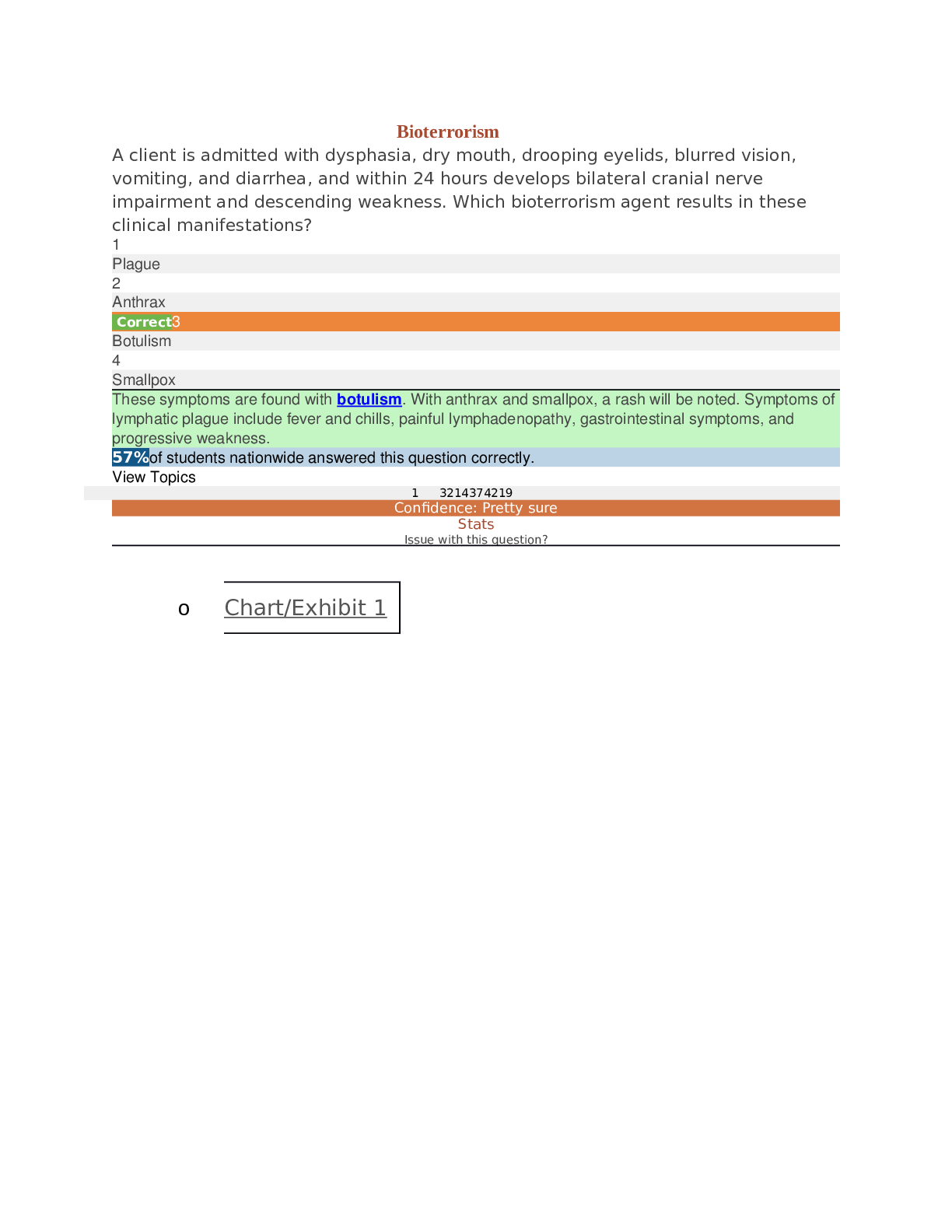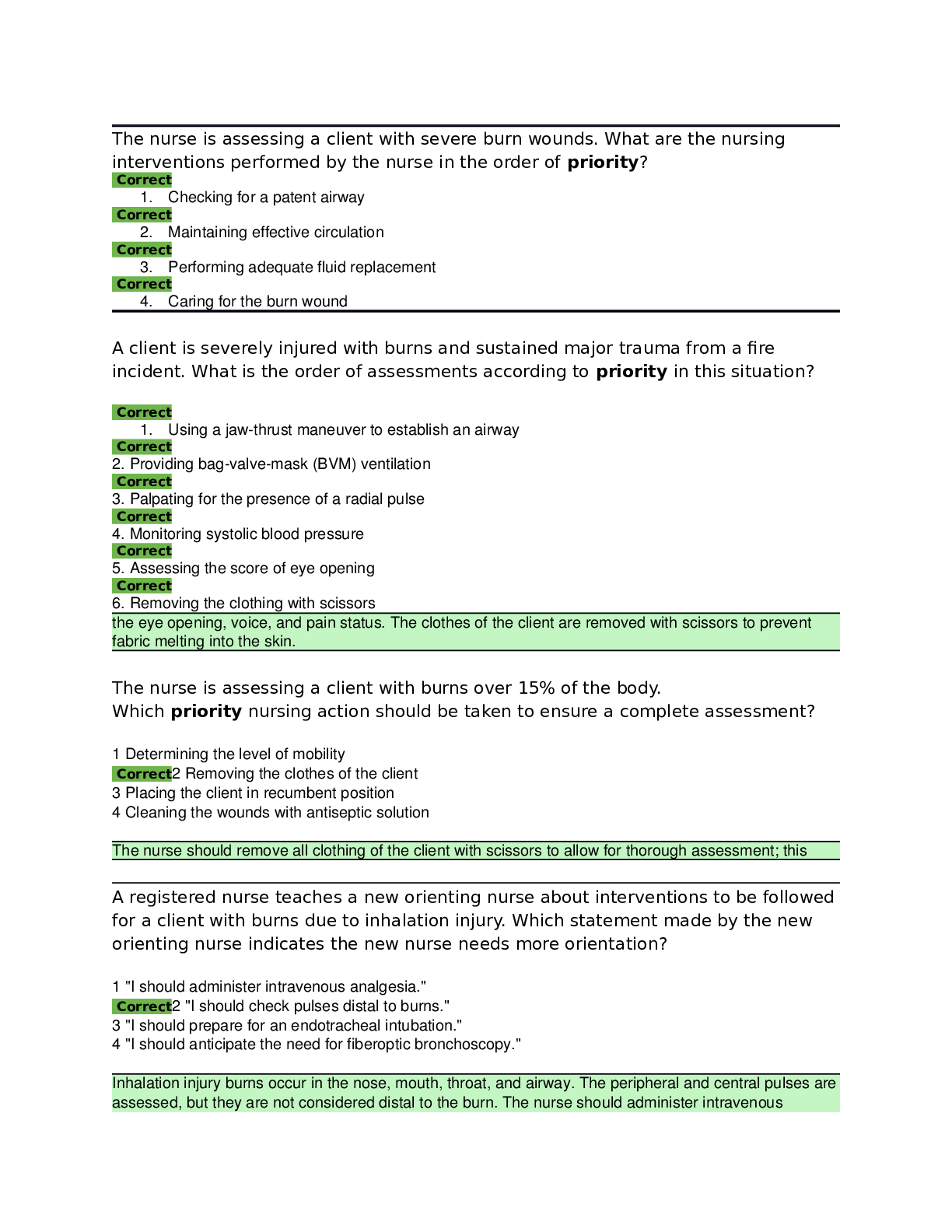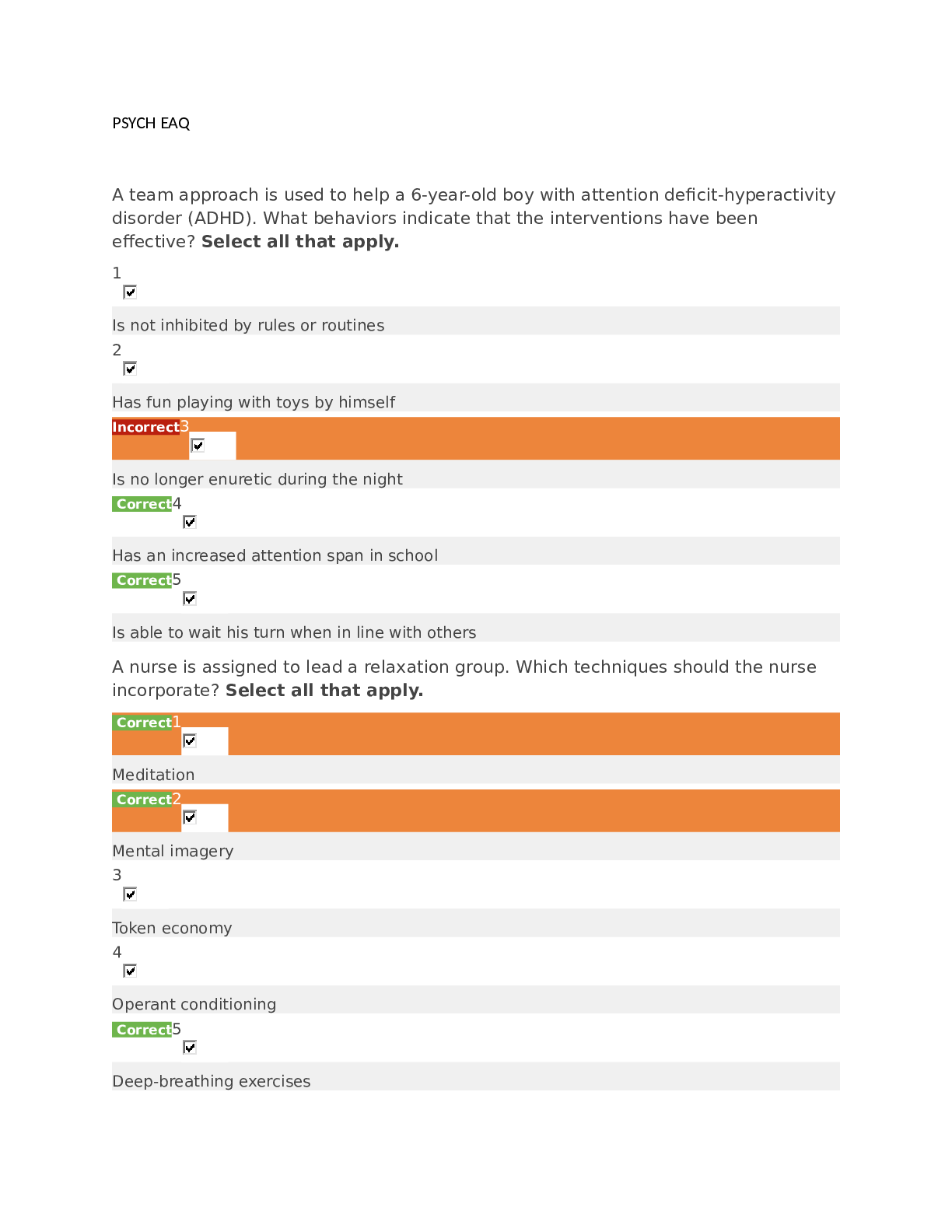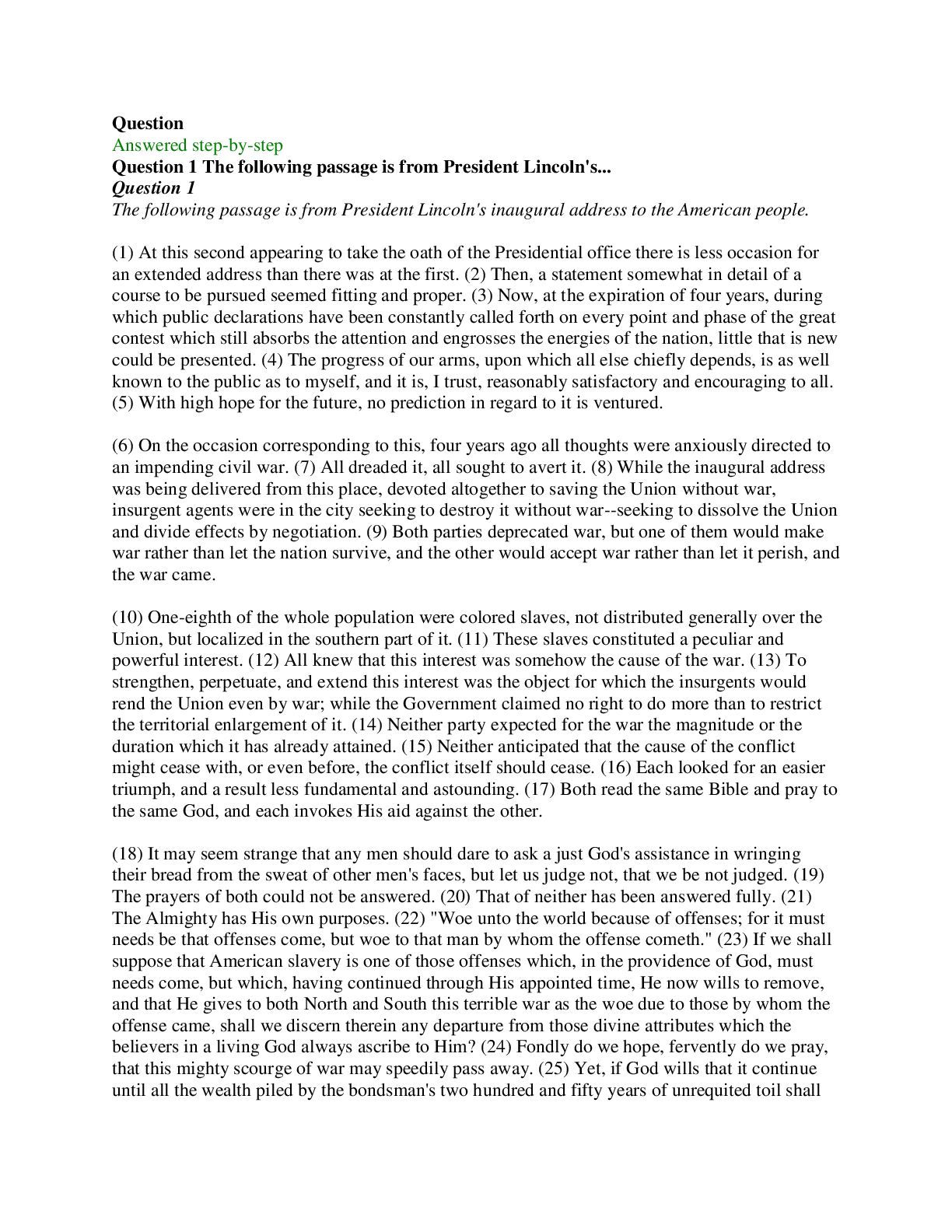English > QUESTIONS & ANSWERS > The following passage is from President Lincoln's inaugural address to the American people. (All)
The following passage is from President Lincoln's inaugural address to the American people.
Document Content and Description Below
Question 1 The following passage is from President Lincoln's inaugural address to the American people. (1) At this second appearing to take the oath of the Presidential office there is less... occasion for an extended address than there was at the first. (2) Then, a statement somewhat in detail of a course to be pursued seemed fitting and proper. (3) Now, at the expiration of four years, during which public declarations have been constantly called forth on every point and phase of the great contest which still absorbs the attention and engrosses the energies of the nation, little that is new could be presented. (4) The progress of our arms, upon which all else chiefly depends, is as well known to the public as to myself, and it is, I trust, reasonably satisfactory and encouraging to all. (5) With high hope for the future, no prediction in regard to it is ventured. (6) On the occasion corresponding to this, four years ago all thoughts were anxiously directed to an impending civil war. (7) All dreaded it, all sought to avert it. (8) While the inaugural address was being delivered from this place, devoted altogether to saving the Union without war, insurgent agents were in the city seeking to destroy it without war--seeking to dissolve the Union and divide effects by negotiation. (9) Both parties deprecated war, but one of them would make war rather than let the nation survive, and the other would accept war rather than let it perish, and the war came. (10) One-eighth of the whole population were colored slaves, not distributed generally over the Union, but localized in the southern part of it. (11) These slaves constituted a peculiar and powerful interest. (12) All knew that this interest was somehow the cause of the war. (13) To strengthen, perpetuate, and extend this interest was the object for which the insurgents would rend the Union even by war; while the Government claimed no right to do more than to restrict the territorial enlargement of it. (14) Neither party expected for the war the magnitude or the duration which it has already attained. (15) Neither anticipated that the cause of the conflict might cease with, or even before, the conflict itself should cease. (16) Each looked for an easier triumph, and a result less fundamental and astounding. (17) Both read the same Bible and pray to the same God, and each invokes His aid against the other. (18) It may seem strange that any men should dare to ask a just God's assistance in wringing their bread from the sweat of other men's faces, but let us judge not, that we be not judged. (19) The prayers of both could not be answered. (20) That of neither has been answered fully. (21) The Almighty has His own purposes. (22) "Woe unto the world because of offenses; for it must needs be that offenses come, but woe to that man by whom the offense cometh." (23) If we shall suppose that American slavery is one of those offenses which, in the providence of God, must needs come, but which, having continued through His appointed time, He now wills to remove, and that He gives to both North and South this terrible war as the woe due to those by whom the offense came, shall we discern therein any departure from those divine attributes which the believers in a living God always ascribe to Him? (24) Fondly do we hope, fervently do we pray, that this mighty scourge of war may speedily pass away. (25) Yet, if God wills that it continue until all the wealth piled by the bondsman's two hundred and fifty years of unrequited toil shall be sunk, and until every drop of blood drawn with the lash shall be paid by another drawn with the sword, as was said three thousand years ago, so still it must be said "the judgments of the Lord are true and righteous altogether." (26) With malice toward none, with charity for all, with firmness in the right as God gives us to see the right, let us strive on to finish the work we are in, to bind up the nation's wounds, to care for him who shall have borne the battle and for his widow and his orphan, to doo all in which may achieve and cherish a just and lasting peace among ourselves and with all nations. The primary purpose of the speech is to a) outline reasons to blame the South for the war b) unify and heal a divided country after the war c) argue that slavery was the primary cause for the war d) establish the biblical support for the war Question 2(Multiple Choice Worth 3 points) (04.01 MC) The following passage is from President Lincoln's inaugural address to the American people. (1) At this second appearing to take the oath of the Presidential office there is less occasion for an extended address than there was at the first. (2) Then, a statement somewhat in detail of a course to be pursued seemed fitting and proper. (3) Now, at the expiration of four years, during which public declarations have been constantly called forth on every point and phase of the great contest which still absorbs the attention and engrosses the energies of the nation, little that is new could be presented. (4) The progress of our arms, upon which all else chiefly depends, is as well known to the public as to myself, and it is, I trust, reasonably satisfactory and encouraging to all. (5) With high hope for the future, no prediction in regard to it is ventured. (6) On the occasion corresponding to this, four years ago all thoughts were anxiously directed to an impending civil war. (7) All dreaded it, all sought to avert it. (8) While the inaugural address was being delivered from this place, devoted altogether to saving the Union without war, insurgent agents were in the city seeking to destroy it without war--seeking to dissolve the Union and divide effects by negotiation. (9) Both parties deprecated war, but one of them would make war rather than let the nation survive, and the other would accept war rather than let it perish, and the war came. (10) One-eighth of the whole population were colored slaves, not distributed generally over the Union, but localized in the southern part of it. (11) These slaves constituted a peculiar and powerful interest. (12) All knew that this interest was somehow the cause of the war. (13) To strengthen, perpetuate, and extend this interest was the object for which the insurgents would rend the Union even by war; while the Government claimed no right to do more than to restrict the territorial enlargement of it. (14) Neither party expected for the war the magnitude or the duration which it has already attained. (15) Neither anticipated that the cause of the conflict might cease with, or even before, the conflict itself should cease. (16) Each looked for an easier triumph, and a result less fundamental and astounding. (17) Both read the same Bible and pray to the same God, and each invokes His aid against the other. (18) It may seem strange that any men should dare to ask a just God's assistance in wringing their bread from the sweat of other men's faces, but let us judge not, that we be not judged. (19) The prayers of both could not be answered. (20) That of neither has been answered fully. (21) The Almighty has His own purposes. (22) "Woe unto the world because of offenses; for it must needs be that offenses come, but woe to that man by whom the offense cometh." (23) If we shall suppose that American slavery is one of those offenses which, in the providence of God, must needs come, but which, having continued through His appointed time, He now wills to remove, and that He gives to both North and South this terrible war as the woe due to those by whom the offense came, shall we discern therein any departure from those divine attributes which the believers in a living God always ascribe to Him? (24) Fondly do we hope, fervently do we pray, that this mighty scourge of war may speedily pass away. (25) Yet, if God wills that it continue until all the wealth piled by the bondsman's two hundred and fifty years of unrequited toil shall be sunk, and until every drop of blood drawn with the lash shall be paid by another drawn with the sword, as was said three thousand years ago, so still it must be said "the judgments of the Lord are true and righteous altogether." (26) With malice toward none, with charity for all, with firmness in the right as God gives us to see the right, let us strive on to finish the work we are in, to bind up the nation's wounds, to care for him who shall have borne the battle and for his widow and his orphan, to doo all which may achieve and cherish a just and lasting peace among ourselves and with all nations. The speaker's overall tone might best be described as a) candid and nostalgic b)diplomatic and regretful c) sincere and apologetic d) hopeful and impassioned Question 3(Multiple Choice Worth 3 points) (04.01 MC The following passage is from President Lincoln's inaugural address to the American people. (1) At this second appearing to take the oath of the Presidential office there is less occasion for an extended address than there was at the first. (2) Then, a statement somewhat in detail of a course to be pursued seemed fitting and proper. (3) Now, at the expiration of four years, during which public declarations have been constantly called forth on every point and phase of the great contest which still absorbs the attention and engrosses the energies of the nation, little that is new could be presented. (4) The progress of our arms, upon which all else chiefly depends, is as well known to the public as to myself, and it is, I trust, reasonably satisfactory and encouraging to all. (5) With high hope for the future, no prediction in regard to it is ventured. (6) On the occasion corresponding to this, four years ago all thoughts were anxiously directed to an impending civil war. (7) All dreaded it, all sought to avert it. (8) While the inaugural address was being delivered from this place, devoted altogether to saving the Union without war, insurgent agents were in the city seeking to destroy it without war--seeking to dissolve the Union and divide effects by negotiation. (9) Both parties deprecated war, but one of them would make war rather than let the nation survive, and the other would accept war rather than let it perish, and the war came. (10) One-eighth of the whole population were colored slaves, not distributed generally over the Union, but localized in the southern part of it. (11) These slaves constituted a peculiar and powerful interest. (12) All knew that this interest was somehow the cause of the war. (13) To strengthen, perpetuate, and extend this interest was the object for which the insurgents would rend the Union even by war; while the Government claimed no right to do more than to restrict the territorial enlargement of it. (14) Neither party expected for the war the magnitude or the duration which it has already attained. (15) Neither anticipated that the cause of the conflict might cease with, or even before, the conflict itself should cease. (16) Each looked for an easier triumph, and a result less fundamental and astounding. (17) Both read the same Bible and pray to the same God, and each invokes His aid against the other. (18) It may seem strange that any men should dare to ask a just God's assistance in wringing their bread from the sweat of other men's faces, but let us judge not, that we be not judged. (19) The prayers of both could not be answered. (20) That of neither has been answered fully. (21) The Almighty has His own purposes. (22) "Woe unto the world because of offenses; for it must needs be that offenses come, but woe to that man by whom the offense cometh." (23) If we shall suppose that American slavery is one of those offenses which, in the providence of God, must needs come, but which, having continued through His appointed time, He now wills to remove, and that He gives to both North and South this terrible war as the woe due to those by whom the offense came, shall we discern therein any departure from those divine attributes which the believers in a living God always ascribe to Him? (24) Fondly do we hope, fervently do we pray, that this mighty scourge of war may speedily pass away. (25) Yet, if God wills that it continue until all the wealth piled by the bondsman's two hundred and fifty years of unrequited toil shall be sunk, and until every drop of blood drawn with the lash shall be paid by another drawn with the sword, as was said three thousand years ago, so still it must be said "the judgments of the Lord are true and righteous altogether." (26) With malice toward none, with charity for all, with firmness in the right as God gives us to see the right, let us strive on to finish the work we are in, to bind up the nation's wounds, to care for him who shall have borne the battle and for his widow and his orphan, to doo all which may achieve and cherish a just and lasting peace among ourselves and with all nations. The speaker develops the passage primarily through a) appeals to the audience's emotion and sentiment b) accumulation of specific detail and evidence c) assertion followed by qualification and exposition d) an allegation supported by authenticated proof Question 4(Multiple Choice Worth 3 points) (04.01 MC) The following passage is from President Lincoln's inaugural address to the American people. (1) At this second appearing to take the oath of the Presidential office there is less occasion for an extended address than there was at the first. (2) Then, a statement somewhat in detail of a course to be pursued seemed fitting and proper. (3) Now, at the expiration of four years, during which public declarations have been constantly called forth on every point and phase of the great contest which still absorbs the attention and engrosses the energies of the nation, little that is new could be presented. (4) The progress of our arms, upon which all else chiefly depends, is as well known to the public as to myself, and it is, I trust, reasonably satisfactory and encouraging to all. (5) With high hope for the future, no prediction in regard to it is ventured. (6) On the occasion corresponding to this, four years ago all thoughts were anxiously directed to an impending civil war. (7) All dreaded it, all sought to avert it. (8) While the inaugural address was being delivered from this place, devoted altogether to saving the Union without war, insurgent agents were in the city seeking to destroy it without war--seeking to dissolve the Union and divide effects by negotiation. (9) Both parties deprecated war, but one of them would make war rather than let the nation survive, and the other would accept war rather than let it perish, and the war came. (10) One-eighth of the whole population were colored slaves, not distributed generally over the Union, but localized in the southern part of it. (11) These slaves constituted a peculiar and powerful interest. (12) All knew that this interest was somehow the cause of the war. (13) To strengthen, perpetuate, and extend this interest was the object for which the insurgents would rend the Union even by war; while the Government claimed no right to do more than to restrict the territorial enlargement of it. (14) Neither party expected for the war the magnitude or the duration which it has already attained. (15) Neither anticipated that the cause of the conflict might cease with, or even before, the conflict itself should cease. (16) Each looked for an easier triumph, and a result less fundamental and astounding. (17) Both read the same Bible and pray to the same God, and each invokes His aid against the other. (18) It may seem strange that any men should dare to ask a just God's assistance in wringing their bread from the sweat of other men's faces, but let us judge not, that we be not judged. (19) The prayers of both could not be answered. (20) That of neither has been answered fully. (21) The Almighty has His own purposes. (22) "Woe unto the world because of offenses; for it must needs be that offenses come, but woe to that man by whom the offense cometh." (23) If we shall suppose that American slavery is one of those offenses which, in the providence of God, must needs come, but which, having continued through His appointed time, He now wills to remove, and that He gives to both North and South this terrible war as the woe due to those by whom the offense came, shall we discern therein any departure from those divine attributes which the believers in a living God always ascribe to Him? (24) Fondly do we hope, fervently do we pray, that this mighty scourge of war may speedily pass away. (25) Yet, if God wills that it continue until all the wealth piled by the bondsman's two hundred and fifty years of unrequited toil shall be sunk, and until every drop of blood drawn with the lash shall be paid by another drawn with the sword, as was said three thousand years ago, so still it must be said "the judgments of the Lord are true and righteous altogether." (26) With malice toward none, with charity for all, with firmness in the right as God gives us to see the right, let us strive on to finish the work we are in, to bind up the nation's wounds, to care for him who shall have borne the battle and for his widow and his orphan, to doo all which may achieve and cherish a just and lasting peace among ourselves and with all nations. The religious references throughout the passage accomplish all of the following EXCEPT a)acknowledge the Christian values that bind the North and the South b) illuminate the impossibility of prayers being answered on both sides c) place blame for the war on God for allowing slavery throughout history d) assert that no one should cast judgment for fear of being judged Question 5(Multiple Choice Worth 3 points) (04.01 MC) (1) At this second appearing to take the oath of the Presidential office there is less occasion for an extended address than there was at the first. (2) Then, a statement somewhat in detail of a course to be pursued seemed fitting and proper. (3) Now, at the expiration of four years, during which public declarations have been constantly called forth on every point and phase of the great contest which still absorbs the attention and engrosses the energies of the nation, little that is new could be presented. (4) The progress of our arms, upon which all else chiefly depends, is as well known to the public as to myself, and it is, I trust, reasonably satisfactory and encouraging to all. (5) With high hope for the future, no prediction in regard to it is ventured. The purpose of this first paragraph is to a) refute the rumors circulating about the nature or causes of the war b) acknowledge the reason for the brevity and content of the rest of his speech c) establish the foundational thesis for the speaker's forthcoming argument d) establish the speaker's confidence for the future of a unified country Question 6(Multiple Choice Worth 3 points) (04.01 MC) (10) One-eighth of the whole population were colored slaves, not distributed generally over the Union, but localized in the southern part of it. (11) These slaves constituted a peculiar and powerful interest. (12) All knew that this interest was somehow the cause of the war. (13) To strengthen, perpetuate, and extend this interest was the object for which the insurgents would rend the Union even by war; while the Government claimed no right to do more than to restrict the territorial enlargement of it. (14) Neither party expected for the war the magnitude or the duration which it has already attained. (15) Neither anticipated that the cause of the conflict might cease with, or even before, the conflict itself should cease. (16) Each looked for an easier triumph, and a result less fundamental and astounding. (17) Both read the same Bible and pray to the same God, and each invokes His aid against the other. The primary function of sentence 17 ("Both read the same Bible...") is to a) contrast the religious beliefs that guide the North and the South to war b) decry the role that religion had in perpetuating the institution of slavery c)emphasize the religious beliefs that both the North and the South have in common d) illuminate the role of religion in inspiring the reason and justification for war Question 7(Multiple Choice Worth 3 points) (04.01 MC (18) It may seem strange that any men should dare to ask a just God's assistance in wringing their bread from the sweat of other men's faces, but let us judge not, that we be not judged. (19) The prayers of both could not be answered. (20) That of neither has been answered fully. (21) The Almighty has His own purposes. (22) "Woe unto the world because of offenses; for it must needs be that offenses come, but woe to that man by whom the offense cometh." (23) If we shall suppose that American slavery is one of those offenses which, in the providence of God, must needs come, but which, having continued through His appointed time, He now wills to remove, and that He gives to both North and South this terrible war as the woe due to those by whom the offense came, shall we discern therein any departure from those divine attributes which the believers in a living God always ascribe to Him? (24) Fondly do we hope, fervently do we pray, that this mighty scourge of war may speedily pass away. (25) Yet, if God wills that it continue until all the wealth piled by the bondsman's two hundred and fifty years of unrequited toil shall be sunk, and until every drop of blood drawn with the lash shall be paid by another drawn with the sword, as was said three thousand years ago, so still it must be said "the judgments of the Lord are true and righteous altogether." The speaker uses the quotation in sentence 22 ("Woe unto the world...the offense cometh...") to a) suggest that the country is being punished for allowing slavery b) contrast the values of the troops for the North and the South c) imply that the North has a responsibility to destroy the South d) establish the idea that slavery is a necessary woe in the country's history Question 8(Multiple Choice Worth 3 points) (04.01 MC (26) With malice toward none, with charity for all, with firmness in the right as God gives us to see the right, let us strive on to finish the work we are in, to bind up the nation's wounds, to care for him who shall have borne the battle and for his widow and his orphan, to doo all which may achieve and cherish a just and lasting peace among ourselves and with all nations. The anaphora which begins the final paragraph ("With malice towards none, with charity for all") a) contrasts the divided nature of the country as described in the previous paragraph b) emphasizes the speaker's plea to avoid harming others and to help all who need it c) expands on the cautions given to the audience in the paragraph which precedes it d) reminds the audience of the complicated and challenging work they have ahead Question 9(Multiple Choice Worth 3 points) (04.01 MC) (26) With malice toward none, with charity for all, with firmness in the right as God gives us to see the right, let us strive on to finish the work we are in, to bind up the nation's wounds, to care for him who shall have borne the battle and for his widow and his orphan, to doo all which may achieve and cherish a just and lasting peace among ourselves and with all nations. The speaker uses the phrase "to bind up the nation's wounds" to set up a comparison between a) the slaveholding South and the industrial North b) a wounded soldier and a patronizing politician c) an injured person and the war-torn country d) a fatherless family and a nation without a president Question 10(Multiple Choice Worth 3 points) (04.01 MC) (26) With malice toward none, with charity for all, with firmness in the right as God gives us to see the right, let us strive on to finish the work we are in, to bind up the nation's wounds, to care for him who shall have borne the battle and for his widow and his orphan, to doo all which may achieve and cherish a just and lasting peace among ourselves and with all nations. One purpose of the final paragraph is to a) advise the audience that reconstruction will be costly b) encourage listeners to avoid placing blame for the war c) reiterate the South's role in causing the Civil War d) inspire the audience to unite in going forward Question 11 (Essay Worth 20 points) (04.01 MC) Reflect on your process or performance on this multiple-choice practice. Choose ONE of the following questions to answer in a written response. Make sure you answer the question thoroughly and provide detail from the questions and/or the speech as necessary. If you skimmed the question stems first, what observations helped you to return to the passage with a more precise focus? Do you think this technique helped you to answer more questions correctly? Do you think it helped you to answer questions more quickly than if you had read the passage first? Explain why or why not. Describe your process. Did you get the impression that the questions are targeting a specific skill or rhetorical strategy reflected in the passage? If so, describe that skill or strategy and explain how focusing on it during reading helped you to answer the questions. Did the awareness of this skill or strategy focus help you to answer questions correctly or quickly? Explain. Choose one question you think you might have missed. Describe what was challenging about the question or answer choices. Which answer did you end up choosing? What led you to conclude it was the best answer? Describe your process in arriving at your answer, including any test-taking techniques you used. [Show More]
Last updated: 1 year ago
Preview 1 out of 10 pages

Buy this document to get the full access instantly
Instant Download Access after purchase
Add to cartInstant download
We Accept:

Reviews( 0 )
$10.00
Document information
Connected school, study & course
About the document
Uploaded On
Aug 27, 2021
Number of pages
10
Written in
Additional information
This document has been written for:
Uploaded
Aug 27, 2021
Downloads
0
Views
24

.png)
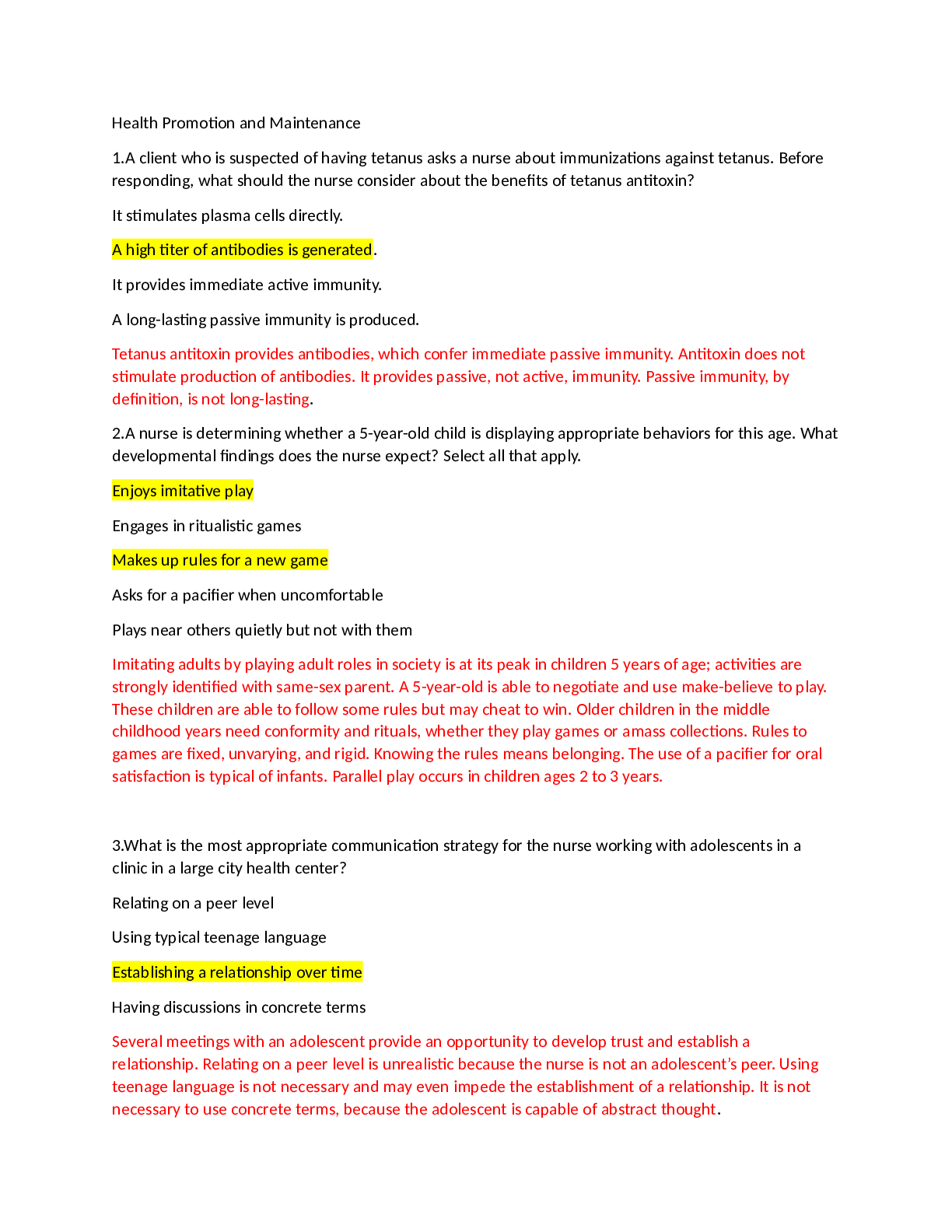

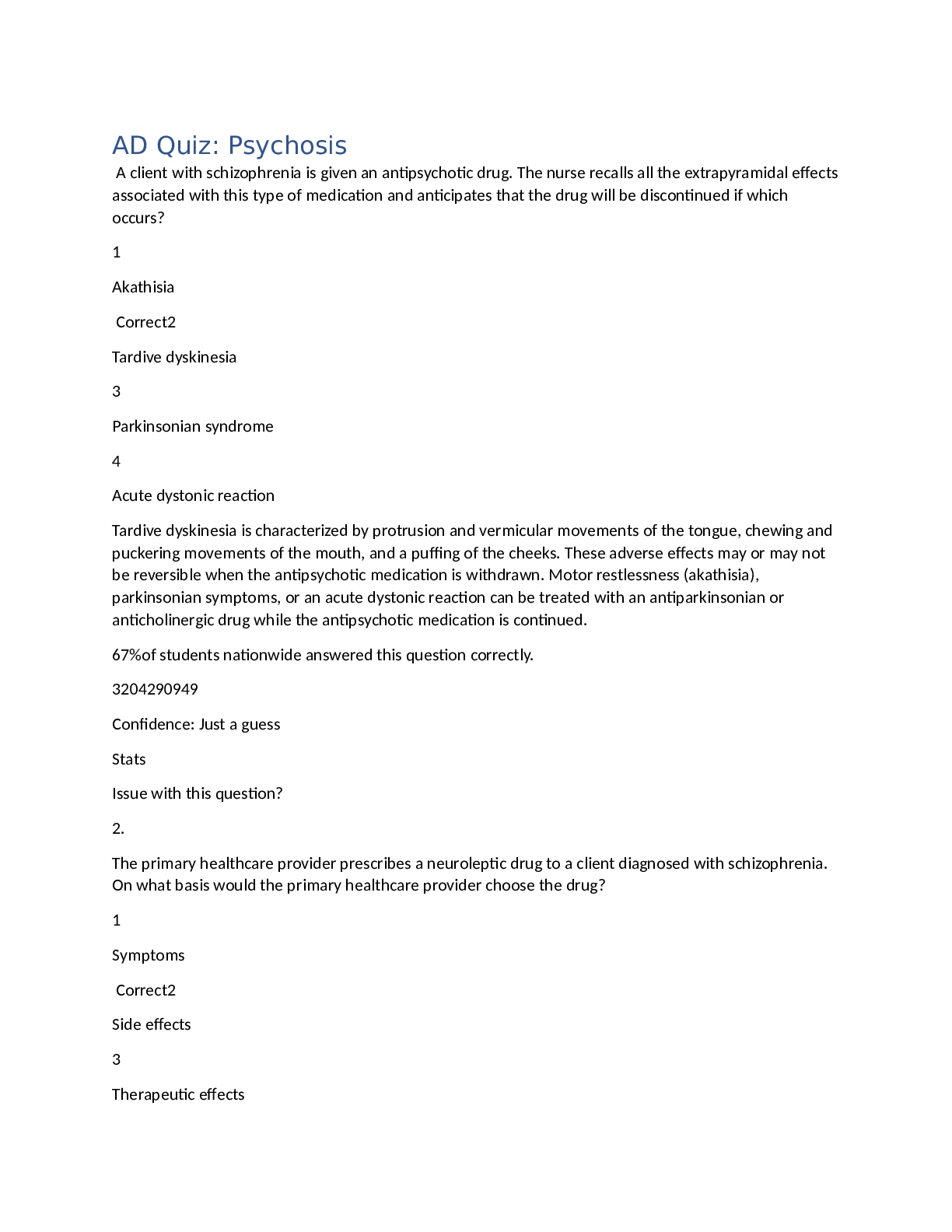
.png)
.png)
.png)
